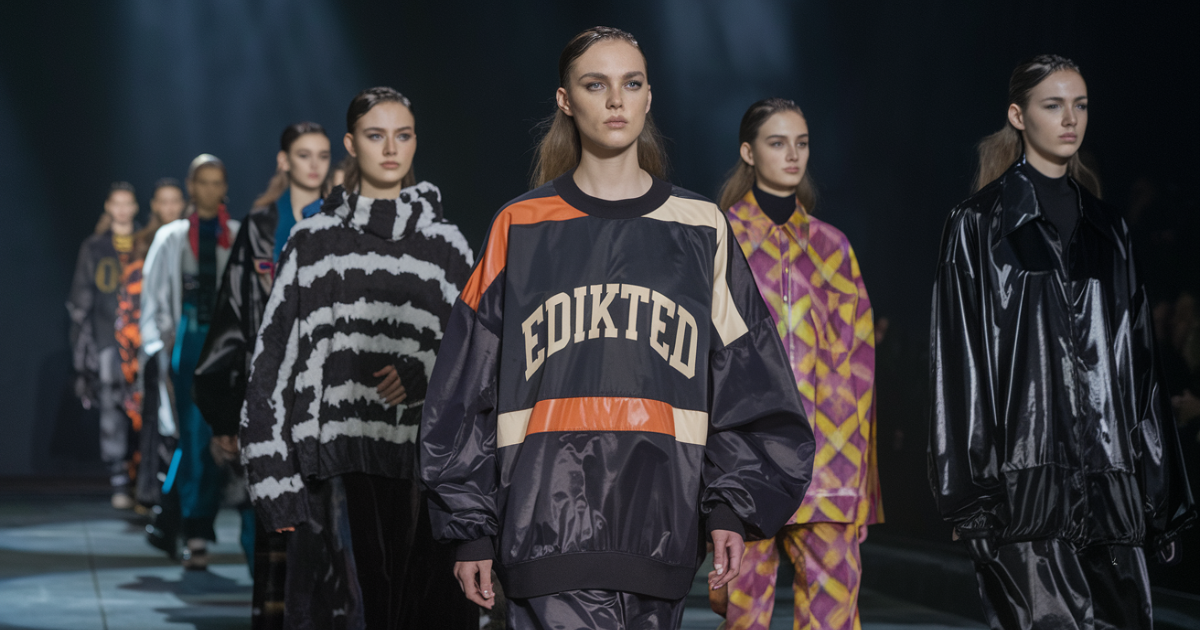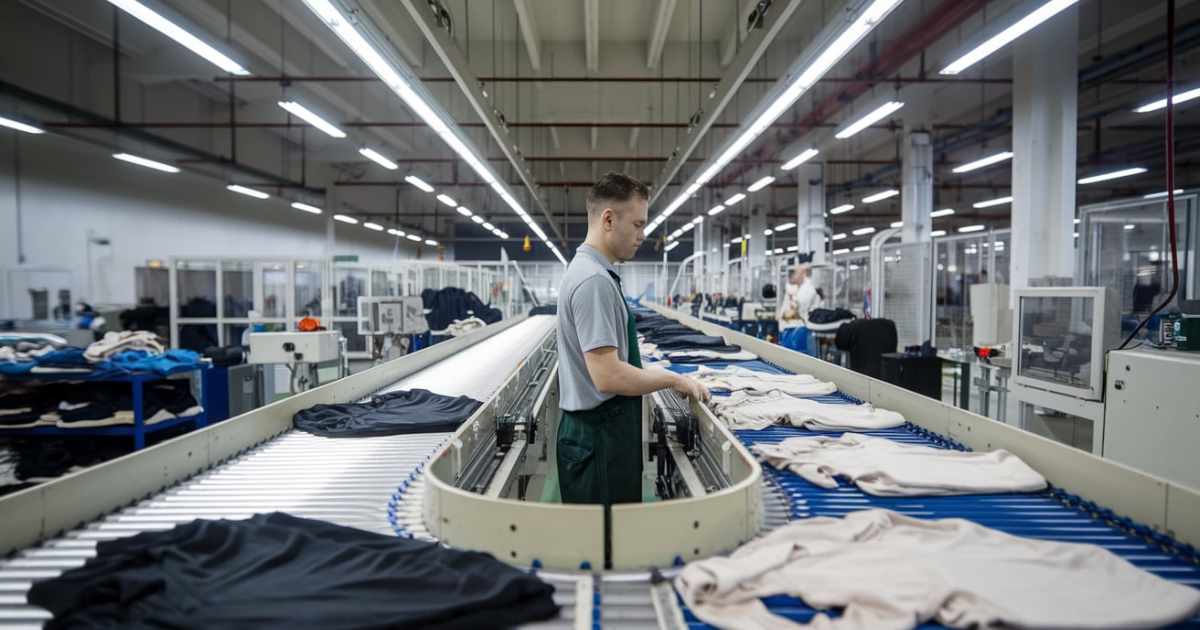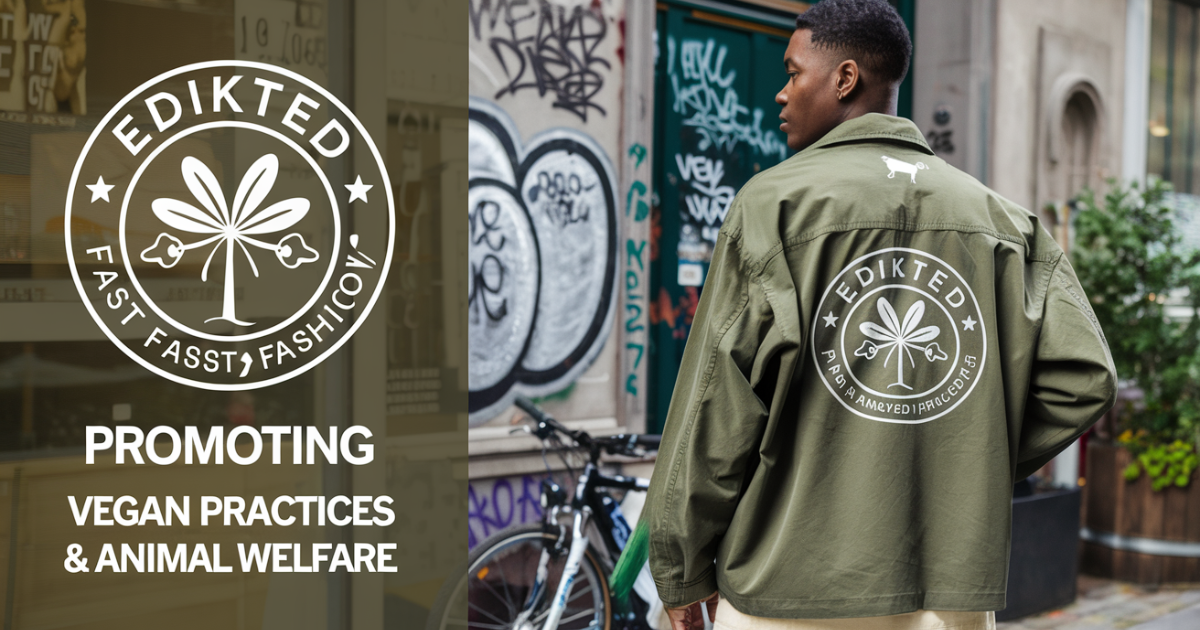The fashion industry has undergone significant changes in recent years, with fast fashion dominating the market. Edikted, a popular Gen-Z fashion brand, has gained attention for its trendy offerings and quick turnaround times. This article explores Edikted’s fast fashion model and its environmental impact, examining Edikted sustainability practices and ethical considerations.
As consumers become more conscious of their environmental footprint, questions arise about the sustainability of brands like Edikted. We’ll delve into Edikted materials, production processes, and initiatives to determine if their approach aligns with eco-friendly fashion alternatives. By examining Edikted’s practices, we can better understand the complexities of balancing style, affordability, and environmental responsibility.
The Rise of Edikted in the Fast Fashion Landscape
Capturing the Gen-Z Market
Edikted has quickly become a favorite among young consumers, particularly those active on social media platforms. The brand’s ability to capitalize on Instagram fashion trends and TikTok fashion styles has fueled its rapid growth. Edikted’s marketing strategy focuses on creating buzz-worthy pieces that resonate with their target audience’s aesthetic preferences.
By leveraging influencer partnerships and user-generated content, Edikted has built a strong online presence. Their approach to fashion aligns with the fast-paced, trend-driven nature of social media culture. This strategy has helped Edikted establish itself as a go-to brand for Gen-Z consumers looking for affordable, stylish clothing.
Edikted’s Business Model
Edikted’s fast fashion model is characterized by rapid production cycles and frequent new releases. The brand prioritizes speed-to-market, often introducing new styles within weeks of their conceptualization. This approach allows Edikted to stay ahead of trends and meet the ever-changing demands of their young consumer base.
However, the speed of Edikted’s production raises questions about the sustainability of their practices. Fast fashion is often associated with increased waste and environmental impact. As we examine Edikted’s business model, it’s crucial to consider how their production methods align with sustainable fashion practices.
Edikted Sustainability Initiatives
Eco-Friendly Materials and Production
Edikted has made efforts to incorporate sustainable fashion materials into their product line. The brand claims to use recycled polyester and organic cotton in some of their garments. These materials are often touted as more environmentally friendly alternatives to traditional fabrics used in fast fashion.
However, the extent of Edikted’s use of eco-friendly materials remains unclear. Transparency in material sourcing and production processes is crucial for assessing a brand’s environmental impact. Edikted’s commitment to sustainable materials needs further examination to determine its effectiveness in reducing the brand’s ecological footprint.
Carbon Neutral Aspirations
Edikted has expressed a commitment to becoming carbon neutral, addressing concerns about carbon emissions in fashion. The brand claims to be working towards reducing its carbon footprint through various initiatives. These efforts include optimizing shipping routes and exploring renewable energy options for their production facilities.
While Edikted’s carbon neutral goals are commendable, the fashion industry’s complex supply chains make this a challenging task. Achieving true carbon neutrality requires a comprehensive approach that addresses all aspects of production and distribution. Edikted’s progress towards this goal and the specific measures they’re implementing warrant closer scrutiny.
Ethical Practices in Edikted’s Supply Chain
Labor Conditions and Fair Wages
Edikted’s ethical practices are an important aspect of assessing the brand’s overall sustainability. The company claims to work with suppliers who adhere to fair labor standards. This includes ensuring safe working conditions and fair wages for workers in their production facilities.
However, the fast fashion industry has a history of labor exploitation and poor working conditions. Edikted’s rapid production cycles raise questions about the pressure placed on workers to meet tight deadlines. More transparency is needed regarding Edikted’s supplier relationships and labor practices to fully evaluate their ethical standards.
Supply Chain Transparency
Transparency is crucial in the fashion industry, especially for brands claiming to be sustainable. Edikted has made efforts to increase supply chain transparency by providing some information about their production processes. This includes details about their manufacturing partners and the countries where their products are made.
Despite these efforts, there is still room for improvement in Edikted’s supply chain transparency. Consumers are increasingly demanding detailed information about the entire production process. Edikted could enhance its credibility by providing more comprehensive data on its suppliers, materials sourcing, and production methods.
Environmental Impact of Edikted’s Fast Fashion Model
Material Choices and Their Consequences
Edikted’s use of materials like polyester and cotton has significant environmental implications. Polyester, a synthetic fabric widely used in fast fashion, is derived from petroleum and doesn’t biodegrade. Cotton production, even when organic, requires substantial water and pesticide use. These material choices contribute to:
- Increased microplastic pollution from synthetic fibers
- Water pollution from textile dyeing and treatment processes
- Soil degradation and water depletion in cotton-growing regions
- Chemical runoff affecting ecosystems and human health
The environmental impact of Edikted’s material choices extends beyond production. The disposal of these materials at the end of their lifecycle contributes to growing textile waste problems. Edikted’s approach to addressing these issues through material innovation and recycling initiatives requires further examination.
Production Speed and Environmental Costs
Edikted’s fast fashion model relies on rapid production cycles to keep up with trends. This speed comes at an environmental cost, contributing to various ecological issues:
- Increased energy consumption in manufacturing processes
- Higher carbon emissions from frequent shipping and transportation
- Greater water usage for production and processing of garments
- Accelerated depletion of natural resources to meet demand
The environmental impact of Edikted’s production speed raises questions about the sustainability of their business model. Balancing trend-driven fashion with ecological responsibility presents a significant challenge for brands like Edikted. Addressing these concerns requires a reevaluation of production practices and a commitment to more sustainable approaches.
Edikted’s Approach to Waste Reduction
Clothing Recycling Initiatives
Edikted has implemented a recycling program to address concerns about fashion industry waste. The brand encourages customers to return used garments for recycling or repurposing. This initiative aims to reduce the amount of clothing that ends up in landfills, a significant environmental issue in the fashion industry.
While Edikted’s recycling program is a step in the right direction, its effectiveness remains to be seen. The challenges of textile recycling, including the complexity of mixed materials and the energy required for processing, need to be considered. Edikted’s commitment to developing more efficient recycling technologies and expanding their program’s reach will be crucial.
Inventory Management and Overproduction
Overproduction is a common issue in fast fashion, leading to excess inventory and waste. Edikted claims to use data-driven approaches to manage inventory and reduce overproduction. By analyzing sales trends and customer preferences, the brand aims to produce more accurately to demand.
However, the nature of fast fashion often leads to the creation of trendy items with short lifespans. This approach can still result in unsold inventory and contribute to fashion waste. Edikted’s efforts to balance trend-driven production with responsible inventory management require ongoing evaluation and improvement.
Edikted’s Vegan Practices and Animal Welfare
Commitment to Animal-Free Products
Edikted proudly promotes its vegan practices, emphasizing the use of animal-free materials in their products. This commitment aligns with growing consumer demand for cruelty-free fashion options. Edikted’s vegan approach extends to accessories and footwear, avoiding materials like leather and fur.
The brand’s dedication to vegan fashion contributes to reduced animal exploitation in the industry. However, it’s important to consider the environmental impact of alternative materials used in place of animal products. Some synthetic alternatives may have their own ecological drawbacks that need to be addressed.
Balancing Vegan Fashion with Sustainability
While Edikted’s vegan practices are commendable from an animal welfare perspective, they present new sustainability challenges. Many vegan alternatives to traditional materials are petroleum-based, raising concerns about their environmental impact. Edikted faces the task of:
- Developing eco-friendly alternatives to animal-derived materials
- Ensuring the durability and longevity of vegan products
- Addressing the end-of-life disposal of synthetic vegan materials
- Balancing animal welfare concerns with overall environmental sustainability
Edikted’s approach to these challenges will be crucial in determining the true sustainability of their vegan fashion offerings. Innovation in materials science and a commitment to circular economy principles could help address these concerns.
The Role of Consumer Behavior in Edikted’s Environmental Impact
Social Media Influence on Consumption Patterns
Edikted’s success is closely tied to social media trends and influencer marketing. Platforms like Instagram and TikTok drive rapid changes in fashion preferences. This dynamic creates a cycle of constant demand for new styles, contributing to:
- Increased production and consumption of clothing
- Shorter lifespans for fashion items, leading to more waste
- Pressure on consumers to constantly update their wardrobes
- A culture of disposable fashion that conflicts with sustainability goals
Edikted’s reliance on social media trends poses challenges for their sustainability efforts. Balancing consumer demand for novelty with environmental responsibility requires innovative approaches to marketing and product lifecycle management.
Educating Consumers on Sustainable Fashion Choices
Edikted has an opportunity to play a role in educating their young consumer base about sustainable fashion. The brand could leverage its social media presence to promote:
- The importance of quality over quantity in clothing purchases
- Care and maintenance tips to extend the lifespan of garments
- The environmental impact of fast fashion consumption
- Alternatives to constant buying, such as clothing swaps or rental services
By promoting more sustainable consumption habits, Edikted could contribute to positive change in the industry. However, this approach may conflict with their current fast fashion business model, requiring a significant shift in strategy.
You Like To Read This:
Is Aritzia Fast Fashion? Analyzing Their Business Approach
Comparison with Other Fast Fashion Brands
Edikted vs. Traditional Fast Fashion Giants
Edikted’s sustainability efforts can be better understood when compared to established fast fashion brands. Here’s a comparison table:
| Aspect | Edikted | Traditional Fast Fashion |
| Production Speed | Very Fast | Fast |
| Target Audience | Gen-Z | Broader demographic |
| Sustainability Claims | Emerging initiatives | Varied, often more established programs |
| Price Point | Low to mid-range | Generally lower |
| Social Media Presence | Strong, trend-driven | Strong, but less Gen-Z focused |
| Transparency | Limited information available | Often more detailed due to longer history |
This comparison highlights Edikted’s position as a newer player in the fast fashion space. While they may lag behind in some sustainability aspects, their focus on Gen-Z consumers presents unique opportunities and challenges.
Industry-Wide Sustainability Challenges
Edikted faces many of the same sustainability challenges as other fast fashion brands. These industry-wide issues include:
- Balancing affordability with ethical production practices
- Reducing the environmental impact of large-scale manufacturing
- Addressing the problem of textile waste and clothing disposal
- Navigating the complexities of global supply chains
- Meeting consumer demand for trendy items while promoting sustainable consumption
Edikted’s approach to these challenges will determine their position in the ongoing debate about fast fashion sustainability. Their ability to innovate and adapt to changing consumer expectations will be crucial for long-term success.
The Future of Edikted and Sustainable Fast Fashion
Potential for Innovation in Sustainable Practices
Edikted, as a relatively new brand, has the potential to lead in sustainable fast fashion innovation. The company could explore:
- Advanced recycling technologies for synthetic materials
- Blockchain-based supply chain tracking for improved transparency
- AI-driven demand forecasting to reduce overproduction
- Partnerships with sustainable material innovators
- Implementation of circular economy principles in product design
By investing in these areas, Edikted could differentiate itself from competitors and appeal to environmentally conscious consumers. The brand’s success in implementing these innovations could set new standards for the industry.
Challenges and Opportunities for Long-Term Sustainability
Edikted faces significant challenges in reconciling fast fashion with true sustainability. The brand must navigate:
- Changing consumer attitudes towards disposable fashion
- Increasing regulatory pressure on environmental practices
- The need for substantial investments in sustainable technologies
- Potential conflicts between rapid trend cycles and sustainable production
- Balancing profitability with environmental and ethical responsibilities
These challenges also present opportunities for Edikted to redefine fast fashion. By addressing these issues head-on, the brand could position itself as a leader in sustainable, trend-driven fashion for young consumers.
Conclusion
Edikted’s fast fashion model presents a complex picture when it comes to environmental friendliness. While the brand has implemented some sustainability initiatives, significant challenges remain. Edikted’s focus on rapid production and trend-driven fashion conflicts with many principles of sustainable clothing production. However, the brand’s efforts in areas like recycling and vegan materials show potential for improvement.
Ultimately, Edikted’s environmental impact will depend on their commitment to innovation and willingness to prioritize sustainability over rapid growth. As consumer awareness grows, Edikted’s future success may hinge on their ability to balance fashion trends with genuine environmental responsibility.
FAQs
Is Edikted considered a sustainable fashion brand?
Edikted has implemented some sustainability initiatives, but their fast fashion model presents challenges to true environmental friendliness.
What materials does Edikted use in their clothing?
Edikted uses a mix of materials, including polyester, cotton, and some recycled fabrics. The brand claims to be exploring more sustainable material options, but specific details are limited.
Does Edikted have a clothing recycling program?
Yes, Edikted has implemented a recycling program encouraging customers to return used garments. However, the effectiveness and scale of this program require further evaluation.
How does Edikted’s fast fashion model impact the environment?
Edikted’s rapid production cycles and trend-driven approach can lead to increased waste, higher resource consumption, and greater carbon emissions compared to slower fashion models.
What steps is Edikted taking to reduce its carbon footprint?
Edikted claims to be working towards carbon neutrality through initiatives like optimizing shipping routes and exploring renewable energy options.



